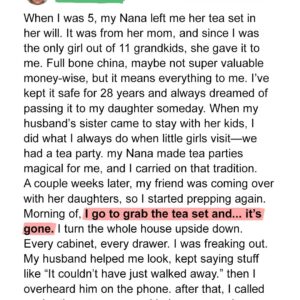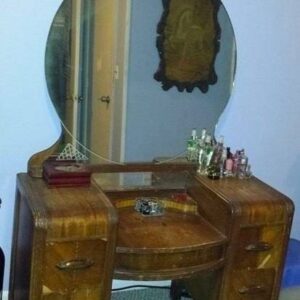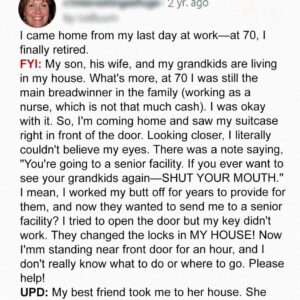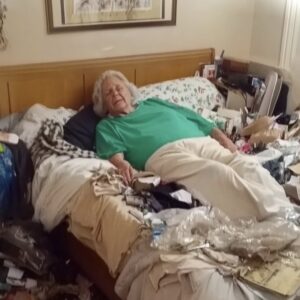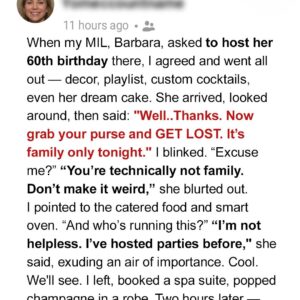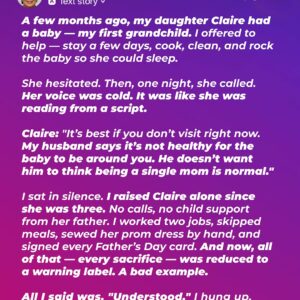Parents told me I was terribly allergic to eggs my whole childhood. We never had them home. When I was 21, I accidently ate mayo dressing and panicked. I raced to the hospital fearing death. My doctor was startled to tell me I wasn’t allergic after tests.
At first, I believed it was wrong. He was instructed to double-check and test more. He did. Same result. No allergies. Not even mildly sensitive. In the antiseptic hospital room, I was stunned. My childhood, every birthday cake and scrambled egg I skipped, ran through my head like a terrible joke.
Next day, I called mom. My voice broke between “I ate mayo” and “I’m fine.” Early on, she was silent. She exhaled and continued, “We should talk. In person.”
I drove home three hours on the weekend. Same tiny house, porch wind chime. As usual, my dad pretended to be busy in the garage when things grew heavy. My mom put me at the kitchen table where she served me porridge with caution every morning.
She says I was a baby when it started. One of my first solid foods caused a terrible rash. The doctor couldn’t specify the cause, but eggs were eaten. She panicked. “I couldn’t bear the thought of something happening to you,” she added. “We just decided.”
They never tested again. Just assumed. The tale progressed. They informed childcare, school, and my college’s health department. I identified with it. “Eggs will kill you” was a family slogan.
I couldn’t decide whether to laugh or cry. Strangely, I understood and felt betrayed. Fear causes strange behavior. But now I was curious. So many queries. They “decided” what else for me?
Over the next few weeks, I tried everything I missed. Scrambled eggs, omelets, custard tarts. No response. I occasionally become angry at the years I lost to dread.
Things changed for me. I doubted everything. Swim lessons were never my thing. What prevented me from attending some sleepovers. Why my parents controlled what I watched and read. I believed it was their parenting style. I doubted it now.
I discussed it with my sister Mia one night. I was thirteen and she had moved away four years before. We were close but rarely discussed childhood. I asked her about the egg. She did. “Honestly,” she added, “I always thought it was weird. The tale was too profound by then.”
She paused.
“You should probably know something else.”
My stomach dropped. I waited.
You remember my move-out summer? The big fight?”
Vaguely. I was young. I remember crying, doors slamming, and then her stuff disappearing.
“It wasn’t just about college,” she said. “It was about you. And Mom.”
Apparently, Mia found a letter once—one she wasn’t supposed to see. It was from a clinic. It mentioned something about “early testing” and “no confirmed allergies.” Mia confronted our parents. They denied everything. Said it was a clerical error. She didn’t believe them. That’s when the trust broke.
“I left because I couldn’t be part of the lie,” she said. “I thought maybe they’d come clean eventually. I didn’t know they’d keep it going for ten more years.”
Shocked. My whole world felt like it was built on soft sand. The more I tried to stand, the more it shifted.
So I went back home again, this time with a list of questions.
My mom was more defensive this time. She said she did what she had to. That I should be grateful I was safe. My dad just nodded along. But I wasn’t a kid anymore. I wasn’t afraid to push back.
I asked about the swimming lessons. Turns out, my mom had a fear of water from her own childhood trauma. She couldn’t handle the idea of me being in a pool. So she said I had a “skin condition” that reacted badly to chlorine. Another lie.
I asked about the sleepovers. There was no big reason. Just a general fear that something bad might happen. So she told parents I had “nighttime asthma” and needed a special machine. More lies.
It was like peeling an onion. Every layer revealed something else. Something smaller, but still dishonest.
After that, I stopped going home for a while. I needed space. I needed air.
But the real twist came a few months later, when I applied for a job I really wanted. It was at a food research company, working in product development. I was thrilled when I got an interview.
Then came the paperwork. Medical history, allergies, etc. I ticked “no known allergies.” But their HR flagged my college health record, which still listed “severe egg allergy.”
They asked for a doctor’s letter. I got one. Sent it in.
Then I got a call. The manager sounded hesitant.
“There’s something you should know,” she said.
Apparently, my “allergy” came up in a background search because of how it was flagged in multiple school systems and medical records. The company had concerns about “integrity” and “transparency.” I didn’t get the job.
I was furious. Not just at the company, but at how far the consequences of that lie had spread.
That night, I sat down and wrote a long letter to my parents. I told them everything—about the job, about Mia, about how I felt growing up in a bubble of fear. I didn’t hold back.
I didn’t send it.
Instead, I drove over and read it to them. Out loud.
My mom cried. My dad looked away the whole time.
When I finished, the room was silent for a while. Then my mom said, “I thought I was protecting you.”
I nodded. “I know. But you also controlled me.”
That was the beginning of a long healing process. It wasn’t instant. There were still arguments, still moments of tension. But at least the truth was on the table now.
A year later, I started a food blog. It was called The Late Blooming Bite. I shared recipes, especially ones I’d missed out on growing up—eggs benedict, soufflés, even deviled eggs with a twist.
The blog took off. People connected with the story. They wrote to me about their own “eggshell lies”—the things their families told them, often out of love, that ended up hurting more than helping.
Then, one day, I got an email. It was from someone who worked at that food research company. She followed my blog and loved my story. She asked if I’d consider coming in for another interview.
I did.
This time, I got the job.
Turns out, one of the founders had read my blog. He said, “You’re exactly the kind of voice we want here—real, resilient, and honest.”
Funny how things turn.
A year after that, I was giving a talk at a local college. The topic was “Stories We Carry.” I shared mine. About the egg allergy, the lies, the fallout, and the slow rebuild.
After the talk, a girl came up to me in tears. She said her parents had done something similar—told her she had asthma so she wouldn’t play sports. She’d just found out it wasn’t true. She thanked me for making her feel less alone.
That night, I realized something.
The truth, even when messy, even when late, is better than a perfect lie.
Today, my relationship with my parents is different. Not perfect. But more honest. My mom still flinches a bit when I talk about my blog. My dad still avoids eye contact when things get emotional. But we’re working on it.
Mia and I are closer than ever. We joke about starting a podcast called “Things We Weren’t Allergic To.” Maybe one day we will.
The thing is, life isn’t about getting everything right. It’s about owning your story. Even the cracked parts. Especially the cracked parts.
And if there’s something I’ve learned through all this, it’s that sometimes, the scariest truths are the ones that set you free.
So here’s the takeaway:
Ask questions. Dig deeper. Don’t be afraid to challenge the story you’ve been told—especially if it limits who you’re allowed to be.
And if you’ve ever been lied to “for your own good,” know this—you’re allowed to be mad. You’re also allowed to heal. On your terms.
If this story hit home for you, share it with someone who needs to hear it. Maybe it’ll crack open a little truth for them too.
And hey—don’t forget to like the post if it made you think.
Thanks for reading.
